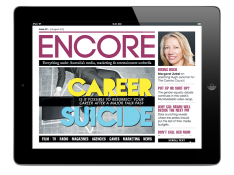Committing career suicide
 An off-hand comment or the airing of an unpopular opinion could be all it takes to halt your journey up the corporate ladder. But can the act of career suicide actually lead to bigger and better things and if not, is it possible to resurrect your career? In a feature that first appeared in Encore, Lee Zachariah finds out.
An off-hand comment or the airing of an unpopular opinion could be all it takes to halt your journey up the corporate ladder. But can the act of career suicide actually lead to bigger and better things and if not, is it possible to resurrect your career? In a feature that first appeared in Encore, Lee Zachariah finds out.
It took just two words for radio presenter Howard Sattler to end his career: “Tim’s gay.”
Interviewing then-Prime Minister Julia Gillard, Sattler, the drivetime host of Fairfax-owned Perth radio station 6PR, gave voice to a rumour concerning the sexuality of the PM’s de facto partner, one that was based solely on his profession as a hairdresser. The baselessness of the rumour, his refusal to move on, and the public outrage over a question that would never be asked of Kevin Rudd, Tony Abbott or John Howard, culminated in the station firing Sattler.
Sattler was no stranger to controversy, and given his position in the Australian media as a “shock jock”, controversy is his area. So how far is too far? Why did this end his career when comments made by other shock jocks – think Kyle Sandilands – didn’t?
In 2012, presenters Yumi Stynes and George Negus found themselves in hot water after comments on Ten’s now defunct morning show The Circle about soldier Corporal Ben Roberts-Smith who received a Victoria Cross medal for his efforts in Afghanistan. Stynes suggested his impressive physique was an indication that his intellect was not up to scratch while Negus joked about Roberts-Smith’s sexual prowess.
The backlash was instant and the controversy is widely believed to have been a contributing factor in the axing of the show after advertisers turned cold on the program.
Both Stynes and Negus were pilloried in the press with Stynes copping the majority of the heat.
Speaking to Encore’s editor Brooke Hemphill in February, Stynes appeared to have adopted a contemplative view of the controversy: “It was a pretty full-on thing to go through. I took away from it that I can make mistakes. Apologising is a great process.” While the show’s axing was a blow to Stynes’ career, today she co-hosts the breakfast show on Sydney’s Mix 106.5 FM, indicating that her comments were not career-ending, with much of the blame for the reaction easily attributed to the wider media.
“It could have just stayed a personal issue between myself and the Victoria Cross winner to whom I did apologise directly,” said Stynes in February. “But the media chose to turn it into a story, and they do that with these things.”
But it’s not just those employed in the public eye that can jeopardise their careers with a single ill-advised act. In June of last year, a publicist at PR agency Mango Sydney, wrote a piece for Mumbrella in which she painted the declining number of journalists as an opportunity for the PR industry. The piece remains one of the most commented on in Mumbrella’s five year history and caused headaches for the agency. “I would like to apologise on behalf of the Mango team for this opinion piece,” read the apology from Mango’s then-managing director Simone Drewry. “While I encourage my team to have opinions and be active in the industry, this piece is insensitive. We hold journalists in high esteem and apologise for the offence caused.”
While staffer declined to speak to Encore for this piece, she remains employed by Mango.
Making a recovery
So if you make a comment that threatens to derail your career, what steps can be taken?
Greg Graham, the director of marketing at Group M who mentors and trains up-and-comers within the agency group, says: “The first thing I would do is counsel the person on how self-aware they are about the ramifications of what they said because in these situations some people just aren’t self-aware, or they don’t have an understanding of the ramifications.”
Cassie Sacks, human resources director at Sydney ad agency The Works, agrees. She says: “The first thing I’d advise them to do is take a breath and step back from the situation. Look at how you are perceived by other people, why other people are feeling that way, and what it was that you did wrong. Don’t put fear and emotion into it and to think about it before you react. The worst thing you could do is get quite emotional and react straight away, or get on social media and make it worse. Take a step back and look at what you’ve done.”
Career resurrection
Despite the definitiveness of its name, can you ever come back from career suicide? Celebrity agent and publicist Max Markson notes that for some people, a career-related controversy can actually be useful.
He says: “Kate Moss was famously caught on the front of a newspaper doing drugs. She lost a lot of her contracts, but she bounced back and was bigger than ever.” While it’s unlikely to be a factor for many of us with more corporate gigs, Moss’ comeback, says Markson, was due to the fact that the “model/drugs/alcohol/rock chic” lifestyle was one that played into certain advertisers’ needs. Markson says: “Maybe that’s an image that some of the companies she was involved with weren’t keen to stick with, but there are others who wanted that bad girl image, so they use that.”
He also notes that the model’s comeback may have occurred “because she was young enough to”. Many career suicides actually coincide with the fast-approaching retirement of an aged perpetrator. Standing up for a presenter at the end of their career is an exercise in futility, whereas firing them can make sense for both PR reasons and finances.
“Howard Sattler was at the end of his career,” says Markson. “Talk back host Ron Casey finished his career by being inappropriate on air. When you’ve had a career suicide moment, you’ve lost your job, you don’t really go on to bigger and better things. If you’re perceived as being trouble, you could be trouble to a future employer.”
Perhaps “comeback” is the wrong term. If Kate Moss’ controversial behaviour ended up netting her more sponsors than she lost could this mean that a move with the potential to be career ending could actually end up being beneficial to your career?
When Fairfax journalist Paddy Manning wrote a story for Crikey criticising the practices of the company he worked for, he was gone in days. His departure was considered noble in some quarters, a form of speaking truth to power. It almost served to reinforce Manning’s credentials, and he has since begun working for Crikey and The Guardian.
While in some cases high risk could lead to high reward, there’s just as great a chance that such a move could be the final nail in the coffin of a promising career. Group M’s Graham says that if it goes the way of the latter, the key to making a recovery is proving that you’ve understood and absorbed the criticisms that have been levelled at you. He says: “Most people, particularly media personalities, they’re not good listeners. They’re a bit disconnected from real people. I know it sounds corny, but you’ve got to be real, you’ve got be genuinely sorry. I don’t think you can fake it.”
Sacks says: “After owning up and apologising and learning from your mistakes, look at other situations that people have been in before when they were able to reinvigorate their career. Look at what they did and see if it applies to you.”
Sacks reiterates that in the case of a gaffe, apologising and moving on is key. She says: “Everyone makes mistakes. The main thing is to show people you’ve learned from that mistake and start to rebuild.”
 This first appeared in the weekly edition of Encore available for iPad and Android tablets. Visit encore.com.au for a preview of the app or click below to download.
This first appeared in the weekly edition of Encore available for iPad and Android tablets. Visit encore.com.au for a preview of the app or click below to download.




Someone else said it better than I could:
http://thingsboganslike.com/20.....lebrities/
User ID not verified.